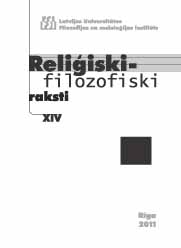Transcendences izpratne un tās nozīme Ž. L. Mariona fenomenoloģijas kontekstā
Understanding and role of transcendence in the context of J.-L. Marion’s phenomenology
Author(s): Māra GrīnfeldeSubject(s): Philosophy
Published by: Latvijas Universitātes Filozofijas un socioloģijas institūts
Summary/Abstract: On of the tasks of this paper is to provide an insight into the understanding of transcendence in the contemporary phenomenology, focusing on French phenomenologist Jean-Luc Marion’s understanding of transcendence. It is considered by contrasting it with the understanding of transcendence in Husserl’s phenomenology. It is shown that both Husserl and Marion give up transcendence that is excluded in phenomenological reduction and regard it as immanent transcendence. Notwithstanding, Marion’s understanding of transcendence doesn’t coincide with Husserlian understanding of transcendence. In Husserl’s phenomenology immanent transcendence is described as intentional correlate the conditions of possibility of which lies within transcendental subjectivity. In Marion’s phenomenology immanent transcendence is described as nonobjectifying givenness that exceeds experience understood as object experience, the conditions of possibility of which could be found in transcendental subjectivity. He characterizes this givenness introducing the notion of saturated phenomenon, emphasizing that within these phenomena, there is a surplus of intuition over intention. These phenomena are also described as absolute, namely, as phenomena that give themselves from themselves without depending on apriori conditions of their possibility. For Marion transcendence is absolute, but at the same time it is also immanent, because it is intuitive self-givenness. These characterizations imply changes both in the notion of subject (it is no more constituting ego that constitutes transcendence, but rather ego itself is constituted as witness) and in the notion of experience (experience is no longer understood in the transcendental sense as the subsuming of intuition under the concept, but as the counterexperience or unconditioned event of giving intuition). Another task of this paper is to consider the role of transcendence in contemporary phenomenology, especially in Marion’s phenomenology. The goal of this paper is to indicate that the understanding of transcendence in Marion’s phenomenology plays important role not only in his understanding of religious experience, but also in the understanding of experience in general. In his phenomenology the question about transcendence is closely connected with the question about religious experience and the possibility of phenomenology of religion. Nevertheless, Marion himself has indicated that experience of nonobjectifying givenness can be found in many different areas of human life, which leads him to attempts to establish a new understanding of experience as unconditioned givenness that can not be reduced to the lived experience of consciousness and must not be restricted to the sphere of religious experience. Similar attempts can be distinguished in the works of other contemporary phenomenologists, especially in the works of Belgian phenomenologist Marc Richir.
Journal: Religiski-filozofiski raksti
- Issue Year: XIV/2011
- Issue No: 1
- Page Range: 7-30
- Page Count: 24
- Language: Latvian

